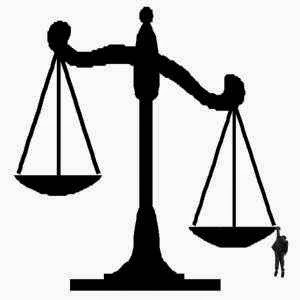 |
| The scales have long been tipped. |
For the uninitiated, absolute immunity means just that; the official cannot be sued, period. This applies to judges and prosecutors, as long as the latter is not acting in an investigatory capacity. Deliberately withholding evidence of innocence? Can't be sued. Letting your witnesses lie on the stand? You're good. Framing an innocent man? Well, you get the picture.
Chemerinsky also discusses qualified immunity, which greatly hampers our ability to police the police. Under this doctrine, police officers (and prosecutors when they are in their investigative capacity) cannot be sued when they violate the constitution if either the right in question was not clearly established at the time, or a reasonable police officer could believe that the conduct would not violate that right. Qualified immunity, as the Court has held, protects all but the incompetent and the corrupt. Unfortunately, it sometimes shelters them as well.
Finally, there is what civil rights lawyers know as Monell (from the 1978 Supreme Court decision in Monell v. Department of Social Services of the City of New York). This case stands for the proposition that municipalities are not responsible for the misconduct of their officers. In virtually any other setting, an employer is liable for the acts of its employees and agents. But not so in civil rights cases. To hold a government liable, you have to show that the constitutional violation resulted from a municipal policy (think Stop and Frisk), or demonstrate that the executive members of the department in question were deliberately indifferent to such violations by their department. This is no easy task. Monell claims are often plead in the early stages of civil rights litigation, but are rarely pursued.
The Supreme Court has slowly fortified and built up legal defenses to even the most flagrant violations of the constitution. It is not remotely surprising that far too many prosecutors and police regard the protections set out in the First, Fourth, Fifth, Sixth, and Fourteenth Amendments as nothing more than advisory opinions, behavioral suggestions that they are free to ignore.
Civil rights lawyers (and many federal judges that I have appeared before) bemoan the lack of individual and governmental accountability, which even the most dimwitted of us recognizes as a causal agent for the ever increasing number of constitutional violations and concordant litigation. To their great shame, the Supreme Court and the Circuit Courts of Appeal have responded by actually expanding the scope of
immunity available.
If we are serious about asking our police agencies and governments to respect and follow the Constitution, there must be consequences when they choose not to.
It's a good article; give it a read.
No comments:
Post a Comment